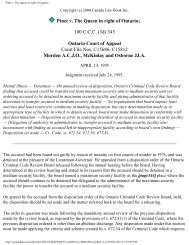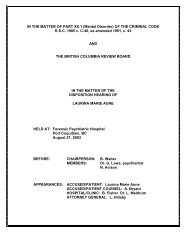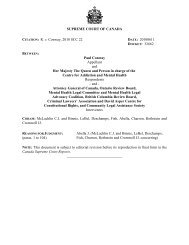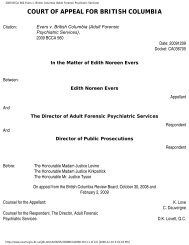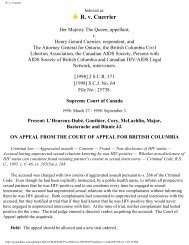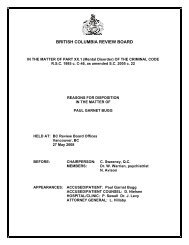R. v. Wong - Reasons for Judgment - British Columbia Review Board
R. v. Wong - Reasons for Judgment - British Columbia Review Board
R. v. Wong - Reasons for Judgment - British Columbia Review Board
You also want an ePaper? Increase the reach of your titles
YUMPU automatically turns print PDFs into web optimized ePapers that Google loves.
R. v. <strong>Wong</strong> - <strong>Reasons</strong> <strong>for</strong> <strong>Judgment</strong><br />
[30] The Crown relies upon Winko v. <strong>British</strong> <strong>Columbia</strong> (Forensic Psychiatric Institute) [1999] S.C.J. No. 31<br />
and Regina v. Demers [2004] 2 S.C.R. 489.<br />
[31] Essentially, the Crown’s argument is based upon the risk posed by the defendant should he decide to leave<br />
the protective environment of Victory House. Because of the defendant’s reluctance to take medication, it can be<br />
assumed that he would soon decompensate if he left this residence. Further, the Crown says intellectual deterioration<br />
may make him a greater risk <strong>for</strong> violence because the defendant is less able to deal with stressful situations. Given<br />
his violent nature when not medicated, the risk of harm to the public is too great.<br />
[32] The Crown also argues it is not in the interests of justice to stay the charges against the defendant because<br />
they are the only guarantee that the defendant will be appropriately supervised. The provisions of the Mental Health<br />
Act may allow him to be certified, but en<strong>for</strong>cement of this power may come too late if the defendant is living on his<br />
own and deteriorates quickly.<br />
[33] Finally, the Crown emphasizes the violent nature of the offences committed by the defendant, his failure to<br />
acknowledge responsibility, and the lack of improvement in his mental health as factors to consider in determining<br />
whether to grant a stay of proceedings.<br />
DECISION<br />
[34] Addressing the first prerequisite to a stay of proceedings pursuant to Section 672.851(7), I find there is clear<br />
in<strong>for</strong>mation be<strong>for</strong>e the Court that the accused remains unfit to stand trial and is not likely to become fit to stand trial at<br />
any time in the future. It is the considered opinion of the defendant’s psychiatrist, Dr. Dilli, as well as the <strong>Review</strong><br />
<strong>Board</strong>, that the defendant’s current mental health renders him unfit to stand trial and, further, that his condition has<br />
remained static during the past fifteen years since the offence date.<br />
[35] Based upon the annual assessments conducted by the <strong>Review</strong> <strong>Board</strong>, as well as Dr. Dilli’s most recent<br />
interview of the defendant, I agree with their conclusion. In my view, it is highly unlikely, at the age of 72, that the<br />
defendant’s mental health will ever improve to the point where he will be fit to stand trial. After fifteen years of<br />
treatment, counselling, and medication, there has been no change in the defendant’s appreciation of the charges<br />
against him or of the court process. Indeed, the defendant continues to deny that there is an outstanding charge<br />
against him. It remains the defendant’s belief that he was a victim in the events giving rise to the charges.<br />
[36] Turning to the remaining prerequisites <strong>for</strong> a stay of proceedings, the Court must first determine the standard<br />
of proof required and whether there is an onus on the defendant to establish that he does not pose a significant threat<br />
to the public or that a stay is in the interests of justice. These issues were squarely addressed by the Ontario Court of<br />
Justice in Kearly. In that case, Schneider J. concluded that Section 672.851 was comparable to Section 672.54,<br />
which addresses the NCR accused. In both cases the Court found the proceedings were more in the nature of an<br />
inquiry and thus not susceptible to a quantifiable standard of proof:<br />
… The indicated standard of “clear in<strong>for</strong>mation” presumably connotes a higher degree of certainty than<br />
being “satisfied”, while both of these thresholds are presumably higher than the court’s opinion, on the<br />
basis of any relevant in<strong>for</strong>mation as set out in subsection (4). …I am of the view that the process set out<br />
in section 672.851 is comparable to the process set out in section 672.54(a) and that there<strong>for</strong>e, as<br />
indicated by the Ontario Court of Appeal in R. v. Peckham [1994] O. J. No. 1995, it is one which is not<br />
susceptible to a quantifiable standard of proof. The process is one which involves the weighing and<br />
balancing of all the relevant considerations. The process is inquisitorial in nature. (at para. 14)<br />
[37] Section 672.54(a) addresses the Court and the <strong>Review</strong> <strong>Board</strong>’s jurisdiction to discharge absolutely an<br />
accused who has been found not criminally responsible <strong>for</strong> an offence due to a mental disorder. An absolute<br />
discharge may be imposed under this section if it is the opinion of the Court or the <strong>Review</strong> <strong>Board</strong> that the accused “is<br />
not a significant threat to the safety of the public”. In Demers the Supreme Court of Canada compared the legal<br />
http://www.provincialcourt.bc.ca/judgments/pc/2006/03/p06_0322.htm (6 of 10)2007-08-23 11:31:05 AM



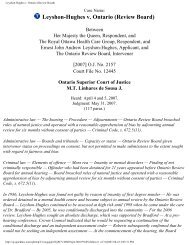
![LaFortune [LaFortunate] (Re) - British Columbia Review Board](https://img.yumpu.com/42779845/1/190x245/lafortune-lafortunate-re-british-columbia-review-board.jpg?quality=85)
